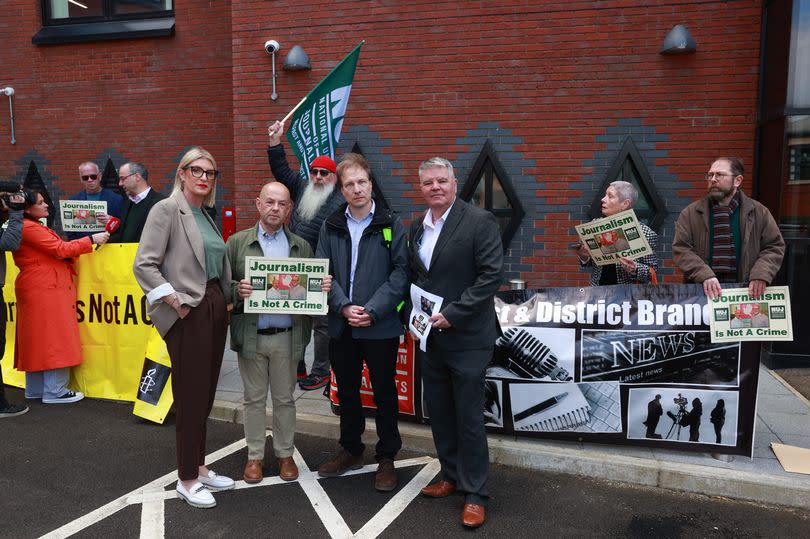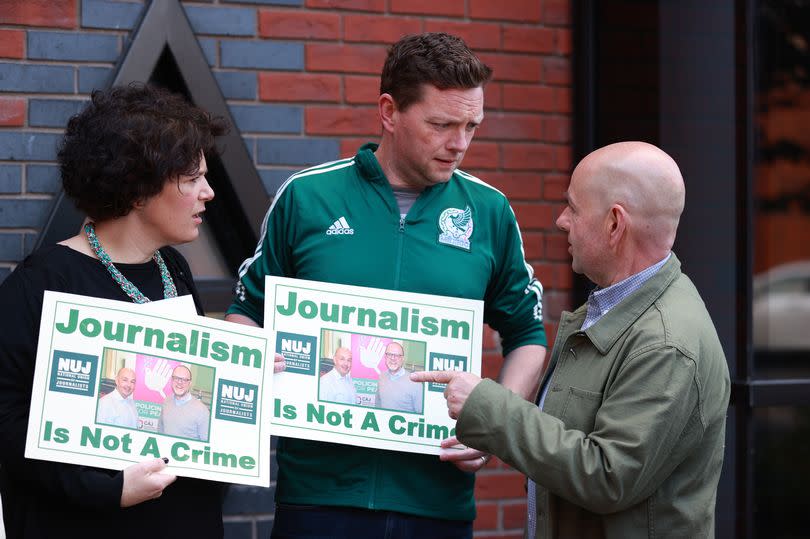PSNI made 323 applications for data relating to journalists over 13 years

Police in Northern Ireland made 323 applications for communications data relating to journalists since 2011, a report has revealed.
A report produced by the Police Service of Northern Ireland (PSNI) said the vast majority of applications were related to journalists who were victims, suspects or witnesses to crime.
The report, which was compiled for the Northern Ireland Policing Board – the PSNI’s oversight body, said of the 323 applications, 10 sought to identify a journalistic source using covert powers.
Read more: BBC to contract tribunal over claims journalist was spied on by police
Read more: News of police surveillance of journalists tip of “very dangerous iceberg”
The report added that the “remainder of the applications did not seek to identify a journalist’s source and their profession may have been entirely unrelated to the request”.
The report also revealed that in the same time period there were 500 applications for communications data related to lawyers who were victims, suspects or witnesses to crime. The figures were placed in the context that the PSNI makes around 8,500 communication data requests annually for a range of criminal offences.
It was also contended that the main power police use is for communications data only, described as the “who, where, when and how” of communication, but “not what was said, written or spoken”.
The report was published online on Thursday following a private meeting of the Policing Board in Belfast. It came after concerns were raised during an Investigatory Powers Tribunal (IPT) hearing in London.
The hearing was during an ongoing case examining allegations that investigative reporters Barry McCaffrey and Trevor Birney were subject to unlawful covert intelligence by the police. It also heard claims the PSNI subjected other journalists to routine phone surveillance.
Earlier this week, PSNI Chief Constable Jon Boutcher announced an independent review, headed by Angus McCullough KC, of any use of surveillance against journalists and other specific groups by the PSNI.
Mr Boutcher has said much of the public concern has arisen because of “misinterpretation of documents” made available in redacted form at the tribunal.

In a statement following the Policing Board meeting, chair Mukesh Sharma welcomed the report, but said it “does not give the board all the assurance it needs”.
“The McCullough Review process may do so, and the board will receive updates as that work progresses,” he said.
“The board takes its human rights monitoring duties seriously. The emphasis we have put on police use of covert surveillance has contributed to the establishment of these arrangements. Police surveillance remains a focus of the board’s human rights work and has constituted a large part of our recent review of privacy and policing.
“The board awaits the conclusion of the McCullough Review and remains open to all courses of action to ensure there is proper accountability on these issues, and will continue to pursue the question of the use of police surveillance powers directly with the Chief Constable.”
At the Stormont Assembly on Monday, Justice Minister Naomi Long rejected a call to hold an independent inquiry, pointing out it was an issue for the Policing Board in the first instance. However, she said she was concerned over the allegations and would act if necessary.
Earlier on Thursday, the NUJ protested outside the Policing Board. Mr McCaffrey was among those who attended.
He said the review established by Mr Boutcher did not go far enough because it does not have the power to compel former officers to provide information.
He added: “Only a public inquiry can compel former officers to come and tell what they knew. Somebody in authority within the PSNI authorised and allowed this to happen. The public needs to know who allowed it to happen.
“There needs to be a public inquiry because these former police officers need to be compelled to come and give evidence. Society needs to know what has been going on for 20 years.”
Patrick Corrigan, Northern Ireland programme director at Amnesty International, said the report left them with even more questions.
“The extent of surveillance revealed in the report goes well beyond the number of cases previously identified through the Investigatory Powers Tribunal,” he said.
“It’s shocking that the police sought journalists’ communications data over 300 times, for the clear purpose of identifying their confidential sources on 10 occasions.
“As well as spying on journalists, the revelation that there were 500 applications for surveillance on lawyers, 365 of which related to private communications data, is simply startling. This report tells us nothing about how many of those incidents may have compromised lawyer-client confidentiality, a legally protected right.
“This report falls badly short of what is required. We will work to ensure the McCullough Review provides more answers, but we are clear that it cannot be a substitute for a proper independent inquiry established by the Policing Board or the Justice Minister.”
Daniel Holder, Director of the Committee on the Administration of Justice (CAJ), added: “The PSNI line seems to be shifting from downplaying that there was a broader problem, to reframing their position, to conceding that they were at it but that it’s not what we think. This is not convincing.”
Thursday’s meeting of the Policing Board was closed to the media. The board’s monthly meetings are usually held in public, but advice sent to media confirmed that its June accountability meeting would take place in private session because of “pre-election guidance."
For all the latest news, visit the Belfast Live homepage here and sign up to our daily newsletter here.

 Yahoo News
Yahoo News 
